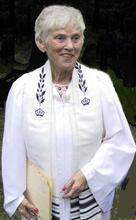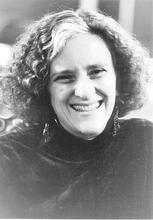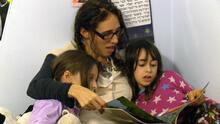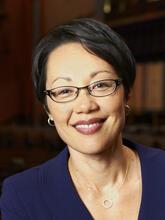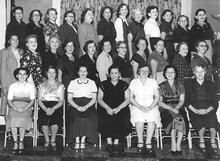Angela Buchdahl
The first Asian American to be ordained as a rabbi and cantor in the world, Rabbi Angela Warnick Buchdahl currently serves as Senior Rabbi of Central Synagogue, a Reform congregation, in New York City. In 2006, Rabbi Buchdahl joined Central Synagogue as Senior Cantor and in 2014 was chosen to lead this congregation as Senior Rabbi. Rabbi Buchdahl is Central Synagogue’s first woman Senior Rabbi and is considered to be a major leader in American Judaism’s continued work on diversity, equity, inclusion, and innovation.
Rabbi Angela Warnick Buchdahl is Senior Rabbi of Central Synagogue, a Reform congregation, in New York City. In 2006, Rabbi Buchdahl joined Central Synagogue as Senior Cantor, and in 2014 she was chosen to lead the congregation as Senior Rabbi. Buchdahl is Central Synagogue’s first woman Senior Rabbi and the first Asian American to be ordained as a rabbi and as a cantor in the world. She is married to Jacob Buchdahl and has three children, Gabriel, Eli, and Rose.
Early Life and Education
Born in Seoul, South Korea, on July 8, 1972, to a Korean Buddhist mother, Sulja Yi Warnick, and an American Ashkenazi Jewish father, Frederick David Warnick, Buchdahl and her family moved to Tacoma, WA, when Buchdahl was five years old. Buchdahl was raised Jewish and attended Temple Beth El, a Reform congregation her great-grandparents helped to found. She has written and spoken about knowing that she and her family were unique, but she says she felt very welcome in her community and her synagogue, even though she was often the only or one of few multiracial Jews in attendance. Buchdahl was very active in her temple and the larger Jewish community as a youth group leader and summer camp song-leader.
While challenges to her Judaism and Jewish identity were commonplace, both because her mother was not Jewish and because of her racial identity, Buchdahl remembers visits to Israel as a teenager and young adult as formative experiences in solidifying her Jewish identity. These trips were pivotal experiences, where the authenticity of her Judaism was questioned. In particular, during one visit to Israel with other young American Jews as a Bronfman Youth Fellow, Buchdahl’s Orthodox Jewish roommate told her that she did not consider her to be Jewish. Other experiences of feeling invisible and marginalized caused her to consider abandoning Judaism altogether. Indeed, on a long-distance telephone conversation with her mother, she expressed that she no longer wanted to be Jewish. When her mother responded by asking if this was possible, Buchdahl realized that, indeed, she could not stop being Jewish in the same way that she could not stop being female, Korean, or anything else about herself, and that these struggles are common to anyone who seriously contemplates what it means to be a Jew. Buchdahl then went on to undergo a conversion or “giyur” that she described as a ceremony to reaffirm her Jewish heritage.
Buchdahl attended Yale University, earning a Bachelor of Arts degree in Religious Studies in 1994. After college, she completed her cantorial and rabbinic studies at Hebrew Union College-Jewish Institute of Religion, where she was a Wexner Graduate Fellow. In 1999, Buchdahl was invested as the first Asian American cantor. Two years later, in 2001, she made history again, being ordained as the first Asian American rabbi.
Career
Rabbi Buchdahl’s first post was as Associate Rabbi and Cantor at Westchester Reform Temple in Scarsdale, NY. In 2006, Buchdahl became Senior Cantor at Central Synagogue in Manhattan. Between 2006 and 2013, Friday night attendance at Central Synagogue doubled and post B’nei Mitzvah retention tripled, in great part due to her leadership and innovative work in congregational worship, through music and livestreaming to viewers and participants worldwide.
On July 1, 2014, Buchdahl succeeded Rabbi Peter Rubinstein to become Senior Rabbi at Central Synagogue. With this change in leadership, Buchdahl became the congregation’s first female senior rabbi and one of only a few women at the time to serve at the helm of a major U.S. synagogue.
In addition to her leadership of Central Synagogue, Rabbi Buchdahl has served as faculty for the Wexner Heritage Foundation and for the Union for Reform Judaism’s Kallot programs, retreats for congregation members who wish to further study and exploration of Judaism with leading scholars and experts. She also serves on the boards of the Jewish Multiracial Network, the Auburn Theological Seminary, Avodah Jewish Service Corps, and the UJA Federation.
Quite famously in December 2014, Rabbi Buchdahl was invited by President Barack Obama to lead the White House’s Lit. "dedication." The 8-day "Festival of Lights" celebrated beginning on the 25th day of the Hebrew month of Kislev to commemorate the victory of the Jews over the Seleucid army in 164 B.C.E., the re-purification of the Temple and the miraculous eight days the Temple candelabrum remained lit from one cruse of undefiled oil which would have been enough to keep it burning for only one day.Hanukkah celebration. Before lighting the Hanukkah candles, Buchdahl commented on the uniqueness of the occasion, asking Obama if he ever thought that the founding fathers of the United States could have imagined the day when an Asian American female rabbi would lead Hanukkah blessings beside an African American president.
In 2011, Newsweek Magazine named Buchdahl as one of “America’s Most Influential Rabbis.” Buchdahl was also named as one of the top five in The Forward’s 2014 “Forward Fifty,” American Jews who have had the most impact nationally during the previous year. In December 2019, the Jewish Telegraphic Agency named her as one among “The Jews who defined the 2010s.”
Diversity and Inclusion
Rabbi Angela Warnick Buchdahl’s Yom Kippur sermon, September 2020, “We Are Family: Rethinking Race in the Jewish Community.”
Rabbi Buchdahl has been featured prominently in various popular news and media outlets, such as NPR, NBC, PBS, The New York Times, The Wall Street Journal, The Jewish Week, The Forward, and Ha’aretz for her visionary work to create diverse and inclusive spaces for Jews and individuals of various racial, ethnic, economic, gender, and religious backgrounds. Inside and outside of Central Synagogue’s walls, Buchdahl has been vocal in debunking the popular idea that Jewishness is a race connected to Ashkenormativity. In light of many racially motivated police shootings and mass killings of people of color in the United States, Rabbi Buchdahl has called upon Jews to take action against racism both within and outside American Jewish communities.
“Angela Buchdahl, First Asian-American Rabbi, Vies for Role at Central Synagogue.” The Forward, August 12, 2013. Accessed February 1, 2021. https://forward.com/news/182011/angela-buchdahl-first-asian-american-rabbi-vies-fo/
“‘Avoidance is no longer an option’: U.S. rabbis focus sermons on racial justice.” The Times of Israel, September 30, 2020. Accessed April 29, 2021. https://www.timesofisrael.com/avoidance-is-no-longer-an-option-us-rabbis-focus-sermons-on-racial-injustice/
“Finding Your Roots - Angela Buchdahl.” PBS. Accessed April 29, 2021. https://www.pbs.org/video/finding-your-roots-rick-warren-angela-buchdahl-and-yasir-qadhi/
“Forward 50 2014: Could This Be the Year of the Jewish Woman?” The Forward. Accessed February 1, 2021. https://forward.com/specials/forward-50-2014/.
Hollander, Sophia. “New Rabbi at Manhattan’s Central Synagogue, ‘a Pioneer.’” The Wall Street Journal, January 17, 2014. Accessed February 1, 2021. https://www.wsj.com/articles/SB10001424052702304149404579326540478713408 .
“The Jews who defined the 2010s.” Jewish Telegraphic Agency, December 27, 2019. Accessed February 1, 2021. https://www.jta.org/2019/12/27/culture/the-jews-who-defined-the-2010s .
“Judaism Shouldn’t Have to Stay Alive Only Because Jews Are Afraid of Everything Else.” Haaretz, January 14, 2019. Accessed February 1, 2021. https:www.haaretz.com/us-news/.premium.MAGAZINE-judaism-shouldn-thave-to-survive-only-because-jews-are-afraid-of-everything-else-1.6828507.
Pogrebin, Abigail. “Light in Unexpected Places.” The Forward. Accessed February 1, 2021.
https://forward.com/opinion/211369/light-in-unexpected-places-my-post-hanukkah-repor/
“Rabbis See Birth of New Movement for Civil Rights.” The New York Jewish Week, June 9, 2020. Accessed April 29, 2021. https://jewishweek.timesofisrael.com/clergy-see-birth-of-new-movement-for-civil-rights/
“We simply feel forgotten about: 9 Asian American Jews speak.” The Forward, March 20, 2021. Accessed April 29, 2021. https://forward.com/opinion/466221/asian-american-jews-atlanta-hate-crimes-speak/




